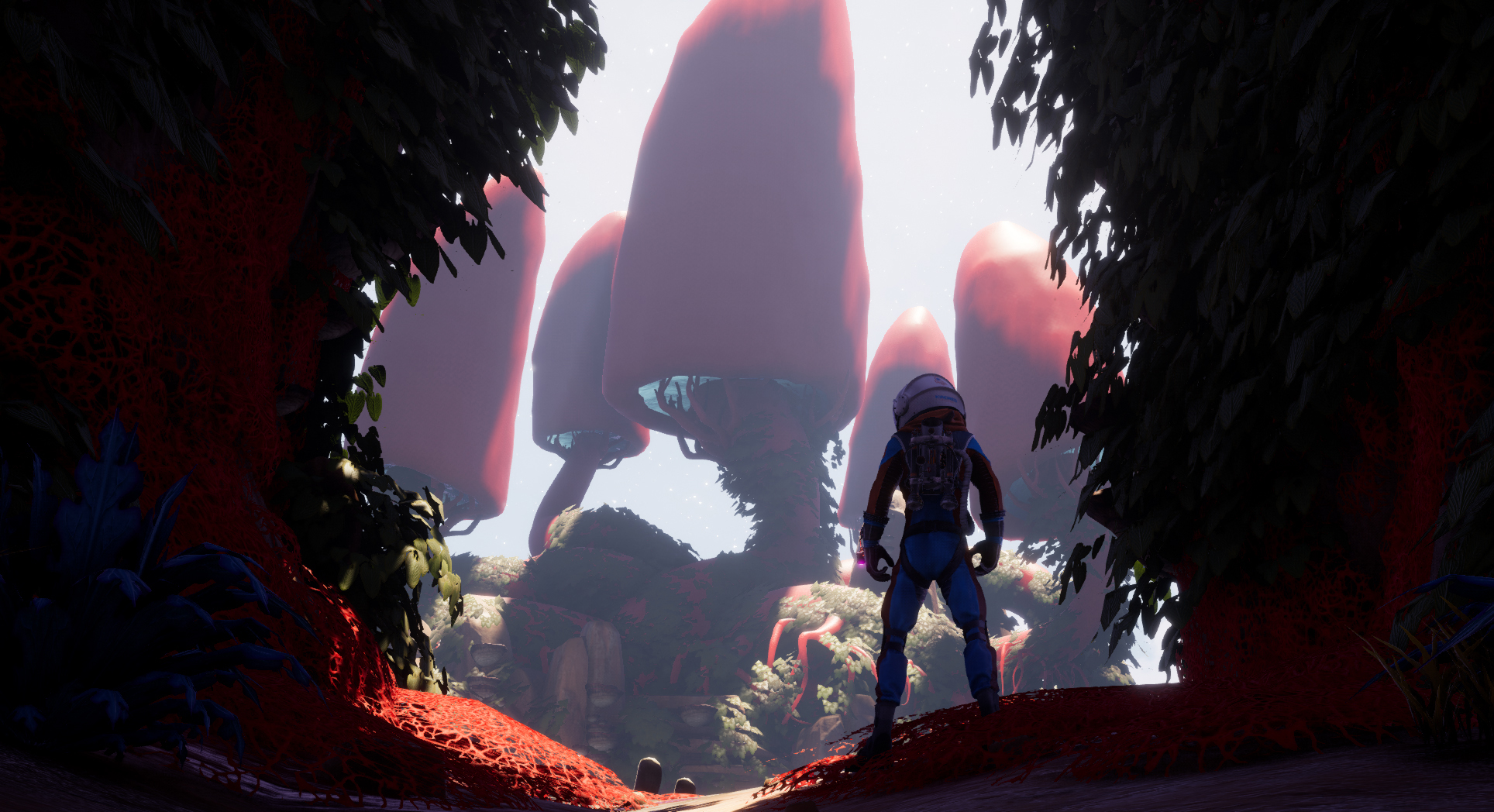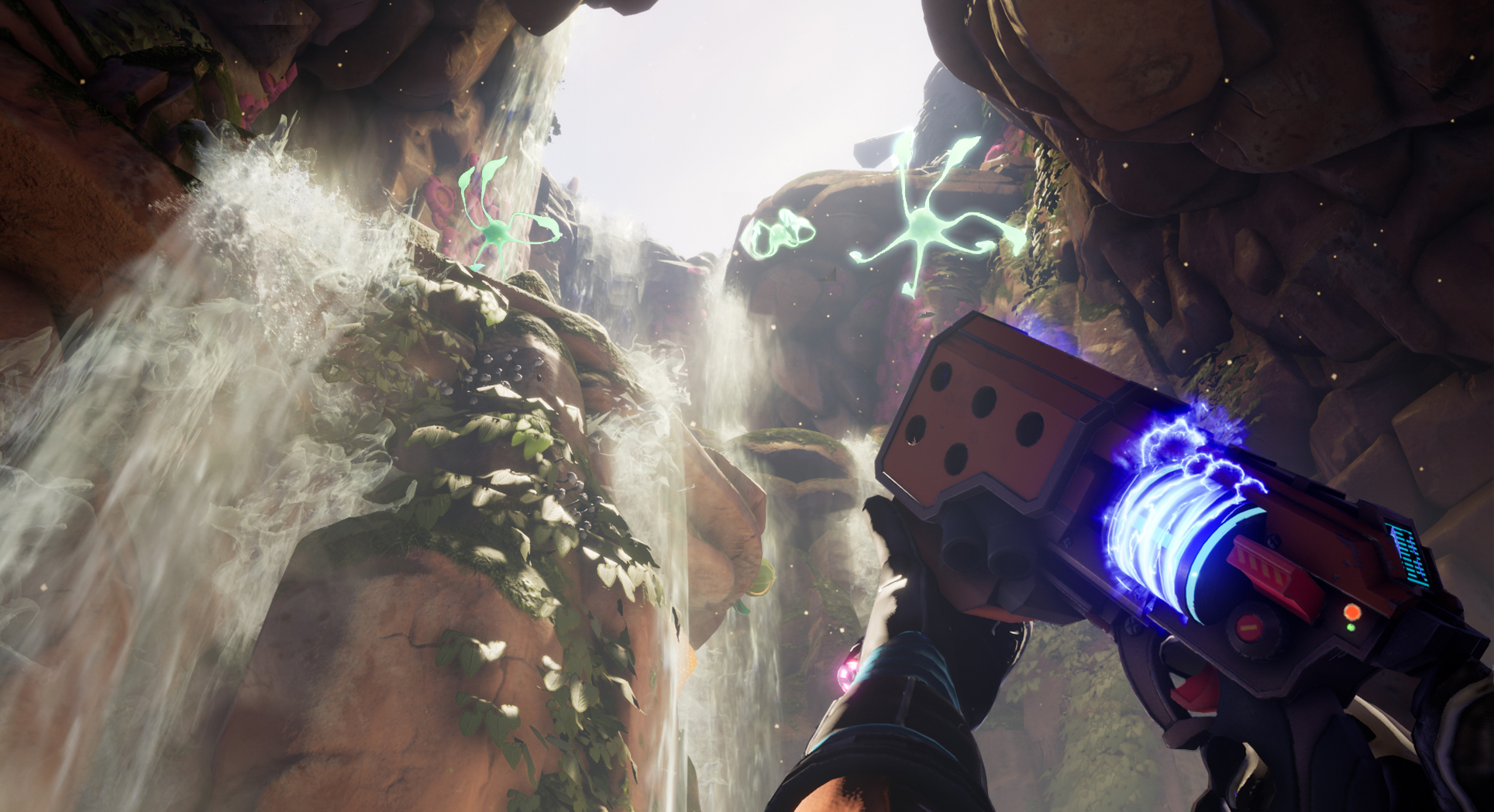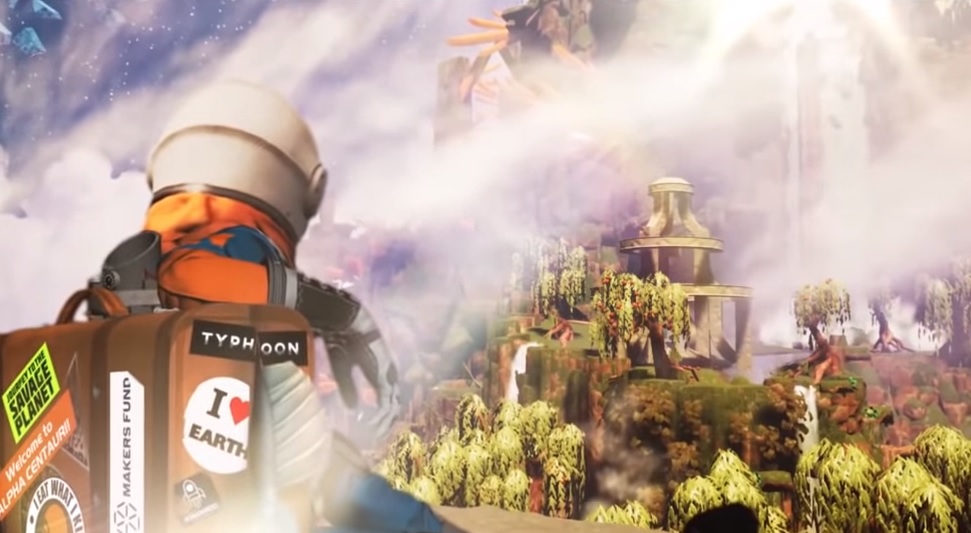Journey to the Savage Planet is an interstellar romp that puts comedy before action
There's a laugh under every rock in this sci-fi adventure

Journey to the Savage Planet has a jetpack, a grappling hook, and a crafting system that doesn't suck. With that alone I was on board with developer Typhoon Studios' first-person sci-fi adventure, and after playing it at a recent pre-E3 2019 demo, I'm excited to see it join the list of E3 2019 games for several reasons, some of which have nothing to do with jetpacks and grappling hooks. Its wacky humor and colorful environment play off each other in a way that really drives you to keep exploring, not just to find more secrets and upgrades, but to see what the game has to say about them, because it's usually pretty damn funny.
We're in the middle of a pocket of sci-fi space adventure games which can run together a bit – looking at you, Outer Wilds and The Outer Worlds – so let's set the record straight. Journey to the Savage Planet is sort of a first-person shooter with a lot of platforming and crafting, and it's set on a single planet, not across a sprawling galaxy. Rather than an endless sandbox, it's also very goal-oriented: as a hapless employee of Kindred Aerospace – the fourth-best interstellar exploration company around, thank you very much – you explore the wild world of AR-Y 26 to find out if it's a good fit for humans. After an hour of dying I was able to deduce that it most certainly isn't, but it is a nice little spot for a jaunty journey.
The planet is the star of the game. It's bright, cartoony, and covered in vastly different biomes crawling with cute and creepy crawlies like bug-eyed chicken balls, two-headed ostrich lizards, and whatever the hell made that sound I just heard in the volcano. Likewise, there are plants that heal you, plants that eat you, and plants that produce wondrous orange goo which increases your health and stamina (though I hear it tastes awful). A big part of your job is cataloging all this wildlife using a Metroid Prime-style scanner, which helps drive home what Journey to the Savage Planet is really about: Exploring and playing with the environment.
I said before that this is a first-person shooter, and I suppose it is because you do have a gun, but the game wasn't built with just shooting stuff in mind. That's probably for the best, because the shooting itself is kind of floaty – granted, I played an early build and I wasn't able to play with a mouse, which really would've helped, but still. Anyway, shooting takes a backseat to sightseeing, platforming, and scavenging. It's the means, not the end. Exploration and experimentation are infinitely more fun and important, in no small part because they're the backbone of the game's RPG-infused crafting.
Modern design

You know those zero-cal sodas, like Coke Zero? Well, the crafting in Journey to the Savage Planet is pretty much Crafting Zero. There's not an ounce of fat on it. It's more of a resource-driven skill tree, really, with materials standing in for experience. You acquire materials naturally while playing, not through overt grinding or gathering. Just blindly bebopping around and tinkering with (or shooting at) whatever I saw, I was able to get materials for a grappling hook and a jetpack upgrade in around 30 minutes.
It was actually refreshing how quickly I was able to progress, and there were more than enough upgrades to keep me motivated to chart new paths and find new resources. There are clear, meaty upgrades, too, which I like. It's hard to get excited about being 10% better at one specific thing. How about: here's a triple jump, a grappling hook, and a gun that actually freakin' works. Now that's something I want to craft. Likewise, while I was only able to play for an hour, it was clear that the way I fight and explore will evolve as I unlock new upgrades over time.
Exploration is paced around crafting, meaning the upgrades you get affect what areas you can access and how easily you can get around them. To get materials to upgrade my jetpack, I went looking around the beginner grasslands area. Once I had a triple jump at my disposal, I was more confident in scaling the area's central parkour path – indicated by a marker for my current quest, which involved surveying the area – and once I reached the top, I spotted the entrance to that volcano I mentioned earlier. I found some new creatures inside the volcano – basically flying jellyfish – which gave me the rest of the materials I needed to make a grappling hook. From there, I made the grappling hook, hurried to the crystal area dotted with anchors which just scream 'come here once you get the grappling hook,' and sadly ran out of time on my demo.
Sign up to the GamesRadar+ Newsletter
Weekly digests, tales from the communities you love, and more
I later realized that I could've explored the tundra first, hunted different creatures, gotten the grappling hook sooner, and harvested some stuff in the crystal biome to upgrade my weapons to prepare for the boss I sadly never got to see. Instead I focused on improving my movement abilities, simply because jumping, sliding, and mantling feel good and I wanted to expand on them during my time with the game. I think that's the advantage of the crafting system over a normal EXP system here. They both get you to the same place – break stuff and kill things to get resources, then improve your character – but the journey is much more varied because certain resources are tied to certain areas. You can't do this thing until you go here, which creates an effective driving force for exploration. Finding a new area is exciting because it means new resources, which means new upgrades, which means news areas. That's a loop I can get into.
In space, no one can hear you laugh

The best part is that the humor underscoring all this exploration is a reward in its own right. There are tons of great comedy games out there, but I always think back to Far Cry 3: Blood Dragon, not necessarily as the best example of a comedy game, but one of the clearest and most easily understood. From item descriptions to actual dialogue, the writing in that game is so damn funny that I felt compelled to find absolutely everything, from guns to secrets to otherwise throwaway lore snippets, just to see what absurd, raunchy, irreverent thing the game had to say about it. After a little more than an hour, I got a very similar vibe from Journey to the Savage Planet. The premise is basically a 'shit goes wrong' simulator, the caricatured world reminds me of '90s Rare, and your ship's sassy narrating AI is just my kind of stupid, sharp-tongued sarcasm.
I get the feeling Journey to the Savage Planet won't be a terribly long, challenging, or complex game, and I don't want it to be. Typhoon Studios describes it as an "earnest comedy," and from what I saw it nails that simple idea. The grappling hook is just the cherry on top.

Austin has been a game journalist for 12 years, having freelanced for the likes of PC Gamer, Eurogamer, IGN, Sports Illustrated, and more while finishing his journalism degree. He's been with GamesRadar+ since 2019. They've yet to realize his position is a cover for his career-spanning Destiny column, and he's kept the ruse going with a lot of news and the occasional feature, all while playing as many roguelikes as possible.


